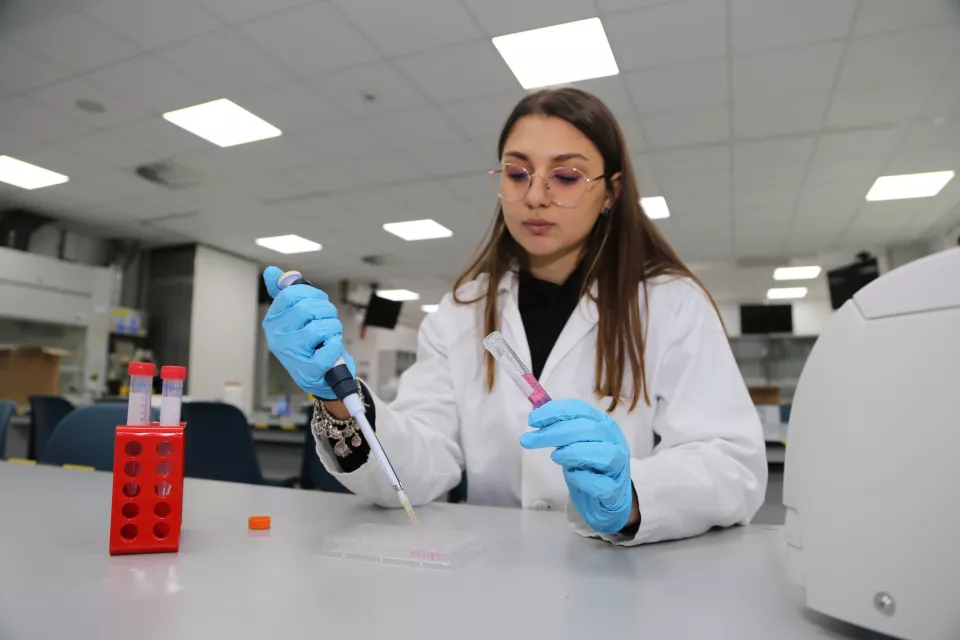
UL Student: Manuela Fadetta
Course: Bsc in Bioscience
Supervisor: Dr George Barreto
Name of Research Project: Understanding tibolone-mitochondria crosstalk in neuroinflammation.
The following is an interview with Manuela Fadetta, a second-year Bioscience student undertaking the Science and Engineering Summer Research Bursary Programme in the Department of Biological Sciences.
Q) Can you tell me a bit about yourself, your background, and why did you decide to study the course you are taking at UL?
I come from a small city in Sicily, Italy and I’ve always been fascinated with science and the intricate processes that govern life. When I had to decide about my college career, I decided to completely change my life, leave my small city and see the world.
When it came time to choose a course of study for higher education, I carefully considered my options and the universities that offered programmes aligned with my interests. After careful consideration, I decided to pursue the BSc in Bioscience programme at the University of Limerick. This was because UL's Bioscience Department has an excellent reputation, and is renowned for its cutting-edge research and distinguished faculty members. The opportunity to learn from experts in the field and engage in ground-breaking research was an enticing prospect for me.
Q) What motivated you to apply for the Science and Engineering Summer Bursary Programme?
My motivation to apply for the Summer Bursary Programme stemmed from a burning curiosity to explore the inner workings of a research lab, a genuine passion for neuroscience, and the eagerness to learn from esteemed professionals in the field. This opportunity represented a significant stepping stone in my academic and career journey, where I could contribute to the advancement of knowledge while honing my skills and expanding my horizons in the captivating realm of neuroscience.
Having Professor Barreto as my supervisor has allowed me to be at the forefront of the field, engaging in meaningful discussions, and participating in cutting-edge research projects. His mentorship and guidance would not only offer me invaluable scientific knowledge but also nurture my critical thinking skills and refine my research abilities.
Q) What are you doing as part of your research here at UL?
As an intern at UL, I have been fortunate to embark on an enriching journey focused on a groundbreaking research project. This project is specifically aimed at investigating the intricate relationship between hormones and the mitochondrial activity of astrocytes, with a profound focus on understanding how this interaction may potentially alleviate neuroinflammation.
Being involved in such a transformative research project has provided me with a remarkable opportunity to expand my scientific knowledge, refine my laboratory techniques, and cultivate a deeper appreciation for the intricate complexities of the human brain.
Q) What skills have you developed over the summer?
During the summer, I’ve been focused on learning the basic techniques for cell culture. This is an important skill for every young scientist that aims to continue in a career in research. I took care of my own flasks of cells and I’ve been involved in different complex experiments that improved my laboratory skills and precision.
Q) What has this experience taught you and what would you recommend it to others?
This experience has provided me with a valuable glimpse into the realities of the research world, demonstrating the effort and intricacies involved in conducting a research project within this complex field. It has enhanced my laboratory skills and familiarity with various procedures, and helped with the development of my teamwork abilities. This experience has also taught me the importance of cultivating patience within the realm of scientific inquiry, as it is not uncommon for results to deviate from our initial expectations.
Q) What are your future career plans, would you consider a career in research?
As I embark on the third year of my undergraduate degree, my vision for the future remains crystal clear. I have a deep interest in pursuing further education through a Master's degree and a PhD, driven by my ambition to work in academia and in a research lab.
